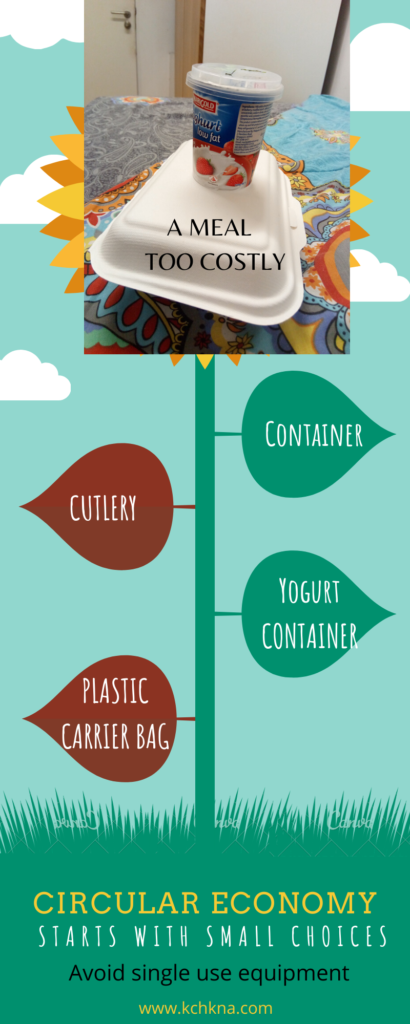Small Steps Towards a Circular Economy

At KCHKNA we realized at the very start that sustainability can not be an afterthought, an add-on we could throw in when we’re comfortable and our business model is solid. We realized that as we grow our responsibilities and stakeholder portfolio will do too. So, as we grow it will become increasingly harder to make changes. Many big organizations know what changes (with regards to the Environment, Sustainability, and Governance) they need to make but it may simply be too costly to implement. Smaller, younger organizations may think this (ESG) could come later when they mature, forgetting that this is the time to most easily imbue certain values into the modus operandi of the enterprise. One such value we take very seriously is aiming for closing the loop. That is why waste management is our first initiative. What is called waste is simply energy in another form, and if we can recover this using the appropriate technologies we can avoid or reduce the need for manufacturing endlessly and in an often unsustainable manner.
What is called waste is simply energy in another form
KCHKNA Inc.
The West (Europe and North America) and the East (Asia) have become superb at mass manufacturing. In fact, we think that while developing countries can make most of what the developed countries can, the developing countries cannot make the same items in an economically viable way. For example, there are people in Malawi who can make shoes–beautiful shoes!–but compared to the more automated, mass manufacturing plants in Thailand, China, Indonesia, India, etc. making shoes locally may often turn out to be an unwise investment. What lacks then is often not technical ability in general, but the ability to amplify one person’s skill. With technology, one woman’s skills are embedded into a tool which can then be used by the many unskilled. This is one of the magic wands behind the rapid development of most countries–the idea of outsourcing some of our labor to some machine (which can be non-physical, such as an algorithm) that can work much faster, more efficiently, and with fewer errors. That we very much love!
With technology, one woman’s skills are embedded into a tool which can then be used by the many unskilled.
KCHKNA Inc.
In fact this is what we aim to do at KCHKNA: To amplify human muscles (and minds). Instead of spending three hours washing clothes, you get your laundry done by an automated machine in 30 mins (6 times faster!) and all the while you could have been doing something else during that 30 mins.
Thus, the idea of embedding skills into tools gave birth to mass manufacturing–roughly the amplified ability to produce many more parts per unit time and labor than was previously possible. Yet, mass manufacturing has shown to be rather unsustainable in the long run. The fact that we can make things much faster has in some cases led to the creation of business models that are hard to live with. One industry where this is glaringly so is the single-use equipment industry.
By way of example, we show in the image a meal that cost about six Singaporean dollars (purchased 23 April 2020). The single use items include: food container, plastic carrier bag, fork and spoon, and the yogurt bottle. It is simply incredible that these items may have been made and shipped from quite far and yet still cost a tiny fraction of six dollars. But all this “labor” just so that one could use the single use items for perhaps 18 minutes and then they are thrown away. The companies that make these items are happy (our relatively educated guess) with this because they can mass manufacture a new set at a reasonable cost. But is the cost really reasonable if we think not just about the corporate balance sheet but the human scale environmental balance sheet? It may well appear less so.
At KCHKNA we are big believers in technology empowering people, and we aim to do just that. But we’re also big believers in business models where as far as possible very little of our resources go to waste. Sometimes, rather than thinking about recycling, we can rethink how we deploy our resources. For it is unwise to deliberately create waste, just so another person can have a business to take care of that waste. But it is equally important that as consumers we reduce our demand so that we can free these waste-producing businesses to do other things for humanity that may well be far more beneficial!
For it is unwise to deliberately create waste, just so another person can have a business to take care of that waste
KCHKNA Inc.